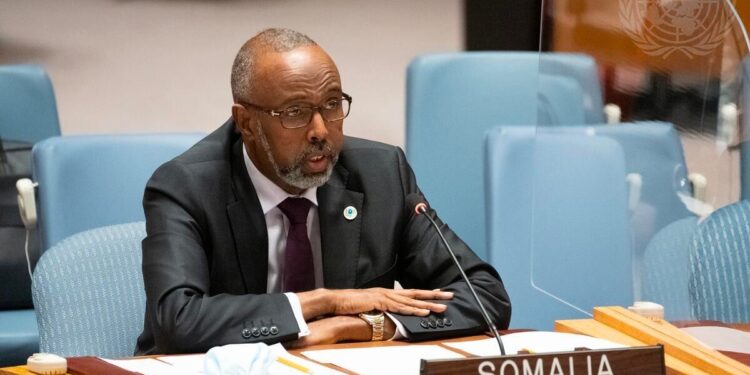New York, (SONNA) – In a major deal with to the United Nations Safety Council, Somalia’s Everlasting Consultant, Ambassador Abukar Dahir Osman, voiced critical considerations relating to Ethiopia’s navy actions inside Somali borders. The ambassador’s assertion dropped at gentle the urgent points stemming from these interventions, emphasizing the vital want for sovereignty respect and adherence to worldwide regulation by all events concerned.
Ambassador Osman’s discourse to the council underscored the paramount significance of sustaining regional stability and the important function that each the United Nations and the African Union play in battle prevention efforts. He burdened the urgency for Ethiopia to honor the ideas of territorial integrity and good neighborliness, reflecting a broader name for diplomatic engagement and peaceable battle decision.
The assertion resonated with the worldwide neighborhood’s overarching objective of sustaining peace and safety within the area. It highlighted the need for a collaborative strategy in addressing the challenges confronted by Somalia, urging for a united entrance in stopping additional escalations.
The ambassador’s name to motion emphasizes the vital function of worldwide cooperation and dialogue in navigating the complicated dynamics of regional conflicts. Because the state of affairs develops, the worldwide neighborhood stays watchful, looking forward to a decision that respects the sovereignty and stability of Somalia and its neighbors.
The assertion from the Somali Authorities presents a powerful condemnation of Ethiopia’s actions relating to their navy presence in Somalia. The Somali Authorities denounces what they describe as Ethiopia’s unlawful actions and misleading ways, framing these actions as a veiled try at annexation below the guise of financial cooperation and integration. They argue that such maneuvers not solely threaten regional stability but additionally set a harmful precedent that undermines the worldwide system of sovereign, unbiased states and erodes the credibility of the rules-based worldwide order.
The assertion additional emphasizes the historic ramifications of annexation, suggesting that it usually results in regional tensions and protracted conflicts with extreme humanitarian penalties. They assert that the institution of an Ethiopian navy base in Somalia is seen as an act of aggression, tantamount to a declaration of struggle in opposition to the Somali state and its folks. The assertion additionally hyperlinks these actions to the resurgence of the violent extremist group Al-Shabaab, implying that Ethiopia’s navy presence might probably negate the progress made in Somalia over the previous thirty years.








